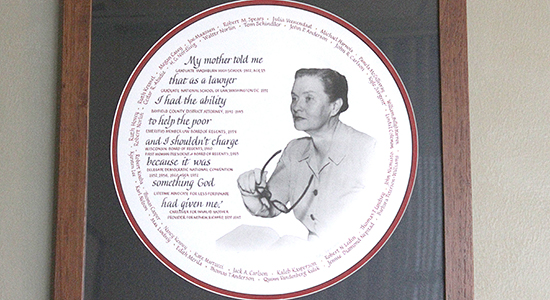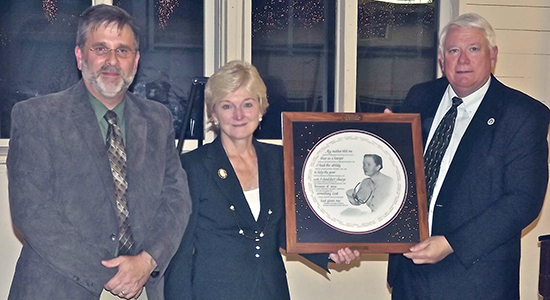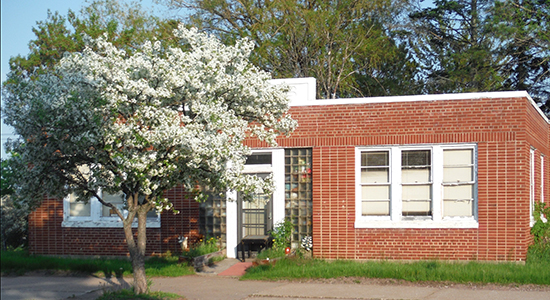
This portrait by Madison Calligrapher Rita Foltz shows Elizabeth Hawkes surrounded by the names of other attorneys from 1922 to 2013 who either were graduates of Washburn High School or practiced in Washburn.
Dec. 7, 2016 – As a teenager, Elizabeth Hawkes skipped her classes at Washburn High School for one of her favorite activities – watching lawyers in action at the Bayfield County Courthouse. More than a decade later, she worked as district attorney in that same courthouse.
Hawkes successfully juggled a demanding law career with her family life and duties as a caregiver, and created a life of achievement and accomplishment, earning her the respect of many. And she did all this as a small-town Northern Wisconsin woman.
Hawkes was born 110 years ago in 1906, yet her career was typical of a 21st-century woman. “She was a very modern woman living in a very different time,” said Hawkes historian and Washburn native, attorney Joe Maassen of Madison.
Shannon Green is communications writer for the State Bar of Wisconsin, Madison. She can be reached by email or by phone at (608) 250-6135.
In 2015, two researchers – Maassen and Bayfield County Judge John Anderson – looked into Hawkes’ history for a Washburn program, “Life in the Law,” initiated by Judge Anderson to recognize local attorneys for a lifetime of service to the law and to their community. The program coincides with the city-wide “Homecoming” celebration that takes place every five years.
Maassen chose Hawkes as the first honoree because of her accomplishments, and because her story had faded. “I felt it was necessary to retell her story before all was forgotten,” Maassen said.
Maassen spent weeks combing through original sources at the Washburn Historical Society and other places to piece together Hawkes’ life and career.
“She was born into a man’s world, yet her dreams were never constrained by her gender,” Maassen said. “She had the drive, the spirit, the passion, and the intellect to succeed.”
The Drive, the Spirit, the Passion to Succeed
Hawkes, a native of Washburn, located on the shores of Lake Superior, was described as precocious and inquisitive as a child. She was often bored with school, and occasionally skipped classes to sneak to the Bayfield County Courthouse. There, she witnessed the criminal trials, “including those of bootleggers of the day whose stills dotted the region,” says Judge Anderson.
She graduated from high school in 1922 at age 15, taught school, attended Boston University for a year, then worked as a congressional aid in Washington, D.C., for U.S. Rep. (and former Washburn mayor) Hubert H. Peavy (1922-1928). She helped advocate for his unsuccessful bill to establish the Apostle Islands as a National Park, among other duties.
While on the East Coast, Hawkes continued her education at Boston University, and attended law school at the National University (now George Washington University School of Law).
Washburn Attorney Elizabeth Hawkes Honored with Portrait
“My mother told me that as a lawyer, I had the ability to help the poor, and I shouldn’t charge, because it was something God had given me.” – Elizabeth Hawkes
These words from Hawkes are the center of a portrait, commissioned for the “Life in the Law Series” program in 2015, and presented by the Washburn Area Historical Society, the Ashland/Bayfield County Bar Association, Bayfield County Circuit Court, and the State Bar of Wisconsin.
The portrait, featuring the work of Madison calligrapher Rita Foltz, shows Hawkes encircled by the names of Washburn High School graduates from 1922 through 2013 who became lawyers, as well as the names of attorneys of Hawkes’ time and after who practiced law in Washburn.
The portrait, formally presented in October to Chief Justice Pat Roggensack, now hangs in the State Bar Center in Madison.

Pictured: A portrait of Elizabeth Hawkes was donated to the State Bar on Oct. 26, 2016. From left: Bayfield County Circuit Court Judge John Anderson, Chief Justice Pat Roggensack, and State Bar Treasurer John Danner. Photo: Rick Olivo, Ashland Daily Press. Read more about the donation.
A Life of Firsts
Hawkes is the first Washburn High School graduate to become a lawyer. She passed the Wisconsin bar exam in 1937, becoming the 118th woman licensed to practice law in Wisconsin. In Washburn, she opened her law practice while caring for a nephew and her aging mother. And she quickly established herself as a “wily and sophisticated trial advocate,” said Judge Anderson.
Hawkes was an accomplished trial lawyer, known for her lightning-quick wit, sharp pen, and sharper tongue. “As the only practicing female lawyer in northern Wisconsin for decades, she learned early that she not only had to be smarter than the men of her profession, she had to be better,” said Judge Anderson. “Her reputation as a tough-as-nails trial lawyer was widely admired, but her dedication was always to her hometown and the less fortunate, whom she represented often at no charge.”
“She was born into a man’s world, yet her dreams were never constrained by her gender.”
During her career, she became the first female district attorney in Bayfield County, and the second in Wisconsin, when she was elected as district attorney in 1941, holding the position through 1944. She became the first female president of the U.W. Board of Regents (1963-64). She ran unsuccessfully for Congress (1944), Wisconsin attorney general (1946), and the state Senate (1950), decades before any women would hold those positions.
“There were only a handful of women practicing law in Wisconsin when she ran for these positions – all while she was running her practice and acting as a caregiver,” Maassen said.
She also earned a seat on the male-dominated head table of the 1950s Wisconsin Democratic Party, Maassen said, and served as a delegate to the party’s national conventions in the 1950s, 1960s, and 1970s.
She is also the first woman to serve on the State Bar of Wisconsin Board of Governors, from July 1941 through June 1945.
A Quarter Tip, a Brandy Manhattan
Maassen’s interest is more than historical – he knew Hawkes in the 1950s and 1960s while he was growing up in Washburn. They attended the same church – St. Louis Catholic Church. She built her law office on the city’s main street, which also included her apartment. While working as a paperboy, Maassen delivered the Duluth News-Tribune to her door. She talked to him like an adult, he remembers.
And she insisted that he put the newspaper inside the outer glass door – something that required a bit of extra effort that he wasn’t always interested in doing. Her tip, she told him, would reflect how well he complied with her request. “I would get a quarter – a good tip – if I put the paper between the doors,” Maassen recalls, “but I’d only get a dime if she wasn’t happy with where I left it.”
She liked to drink brandy manhattans, play jokes on her law partners, and help those in need, often without asking for anything in return. Even in her declining health in later years, clients visited her while she was in her hospital bed. She passed away in Washburn on Feb. 8, 1978, at age 71.

Elizabeth Hawkes’ law office at West Bayfield Street and 1st Avenue West in Washburn. Her apartment is at the back of the building.
Today, Maassen quietly acknowledges Hawkes’ influence on his life – and on Bayfield County – by periodically visiting her gravesite.
“Her life and career were full of achievement and accomplishment,” Maassen said. “She was a unique human being.”
“She was tough but compassionate,” Judge Anderson says. “She was brilliant, yet grounded in a faith in God and inherent goodness in people regardless of stature. Had she been born in a different time, her destiny would have most certainly been much different.”
Her legacy, however, is simple: “That hard work, dedication, and personal responsibility are necessary and admirable.” And those traits are combined with compassion and a sense of duty to help others. “Those are the ideals we grew up with here,” Anderson said. “Those were the ideals of Elizabeth Hawkes.”
